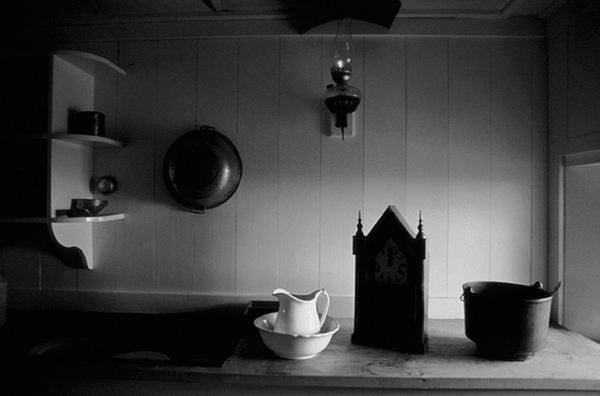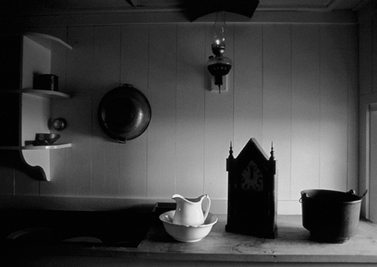
W
e were related to Sam Houston—governor of Tennessee, governor of Texas, rememberer of the Alamo—but not to Whitney. I learned this about my family ten years or so after being born into it. I was not quite sure how this could be true but I did not press the issue. Of more personal interest to me at the time was the fact that we also had a castle. After my father’s father died, my grandmother went with her sister Lucy and their cousin Billy to Scotland and found it, walked around and through the crumbled gray keep and the jagged tower on the cliff overlooking Loch Ness. Billy took a photograph my grandmother later framed and hung on her dining room wall, under the tartan swatches and the coats-of-arms of the rest of the family’s families: the Comyns, the Carrs, the Jareds, the Lowes. Someone among them had fought alongside William Wallace, or so we were told, or so we told ourselves. When I watched Braveheart, years later, I found myself trying to pick out familiar faces among the face-painted hordes. There were a few.
In 1996, when Tennessee celebrated its bicentennial year, my grandmother received a stack of certificates in the mail, one for each of her and my grandfather’s ancestors identified as one of the state’s First Families. She framed those, too, hung them up alongside the tartans and the castle. When we visited her, I would find my way to the dining room, stand before the frame-covered wall, and stare—proud of all this proof that we belonged so surely in this place, in this state, in this world, and had belonged for so long.
Most summers my sister and I were taken along to family reunions and also to cemetery meetings, where the family discussed the upkeep of a fenced-in plot of graves on a bald hilltop in a valley we’d peppered with ourselves since the 1800s at least. These gatherings usually involved catered barbecue, sometimes matching t-shirts, and always the one picnic table spread with ledgers and picture albums and Xeroxed family trees and marriage certificates and birth and death records bearing the studied penmanship of our forebears. Sarah and I would chug chalky lemonade, straddle splintering benches, leaf through the pages to find the relatives we were glad we hadn’t hadn’t been named after: the Geraldines, the Hortenses, the Dorcases. We were often the only kids, the lonely green tip of our limb of the family tree.
It seemed to me then that the chief purpose of these gatherings was to figure out how we were all related to one another, that if we could just figure it all out then we wouldn’t have to keep meeting this way, year after year, always on the hottest day of the summer. I sensed some level of subterfuge, some amount of information being withheld by someone at these meetings, always just enough to merit another one.
When not in the presence of such documentation, we regressed. Anyone whose position within the family required more than a few moments thought to triangulate became a “cousin.” The important thing was that someone, somewhere, knew how it all worked, and the existence of that knowledge seemed like a sort of power on its own, like the ability to plot out each connection point made us even more related, more real, more alive—maybe even insulated us from death itself, despite evidence of its absolute inevitability sitting in piles all around us.
A few older female relatives had ascended to the somewhat less general status of “aunt,” which was generally pronounced like “ain’t,” lending it a negatory air. There was Ain’t Dimp and Ain’t Dimple, one named after the other though I could never remember which. I had an Ain’t Susan of my own. My grandmother’s sister was Ain’t Lucy—first to my dad and his brother, then to everyone else, even my grandmother herself after a while.
My grandmother’s father had died before she was born. She and her sister were raised by their mother, scraping along at the tail end of the Depression; from their front porch they watched Patton’s army march through town after training exercises in the Middle Tennessee hills, which looked so much like France’s but weren’t. When I was little, always hanging in her bedroom were framed photos of her and her sister as children, cheeks tinted rosy. Lucy was older with dark hair, my grandmother’s on the edge of blonde though it darkened over time, and in this way they were like my own sister and me. They seemed like our familiars, and also like their own. They attended college together, got married, raised sons, favored the same turquoise jewelry and glazed pottery and boxed wine, developed a similar patience for house cats deemed intolerable by all others. They live, now, on opposite sides of the same hill.
On Mother’s Day a few years ago, on my parents’ screened porch, my grandmother sat across from me in the creaking metal glider that had once sat outside the house where she no longer lived. She was asking my dad if he remembered a trip they took to Texas when he was a boy. He did.
“We stayed with Ain’t Dodie and them, right?” he said.
“Who’s Ain’t Dodie, again?” I asked. I’d heard this name all my life, though she’d been dead for most of it.
My grandmother squinted at my dad as if the answer might materialize in the air between them. “She’d be your aunt, I guess, but not really,” she said to him. “She was like a sister to me, practically raised me—” She turned to me: “You know my mother was raising us all on her own, because my daddy had died.” I did know this, and nodded. “Well, Dodie was a girl who lived with us. She was kind of adopted, but not officially—not like Lucy.” And then, again to me: “Because, you know, Lucy was adopted.”
She told me this the way you tell someone something you know they already know. But I did not know.
I did not know that my grandmother’s parents had wanted to have children but couldn’t, did not know that they instead adopted a little dark-haired baby girl and named her Lucy, did not know that sometime later my grandmother’s mother had become pregnant after all, did not know that she realized it while her husband was sick in the hospital, did not know that he was so ill the night she meant to tell him that she put it off until morning, did not know that he died in the night before she had the chance.
He didn’t know. I didn’t know. My sister didn’t know, either, and no one else had known that we didn’t know. It wasn’t a family secret, just a detail that had gone unmentioned, and not even strategically so. My shock was greeted with a collective shrug. I reeled for a week, though I saw no point in feeling betrayed, despite the three decades I’d spent unaware—by whatever means, she’d been my grandmother’s sister for eight. It wasn’t that span of time so much as the other: those few months, maybe mere weeks, where my grandmother’s potential existence was thought to be impossible, then became possible, and then impossible again.
There’s a bumper sticker I used to see more of, usually on the tailgates of rusted-out trucks: “AMERICAN BY BIRTH, SOUTHERN BY THE GRACE OF GOD.” When I was a kid I tried to imagine the fates these people imaged they had been spared from: long, mean winters; restaurant menus that refused to classify mac ‘n’ cheese as a vegetable; mosquitos, but also fireflies. Now I know more of what a person who might put such a sticker on his car might be grateful for about the South, but I can still picture him wiping his brows, shaking off chills at the thought of having been made to be alive anywhere else. What close calls we’ve all survived, what narrow odds, what tiny windows we’ve been handed so much through.

